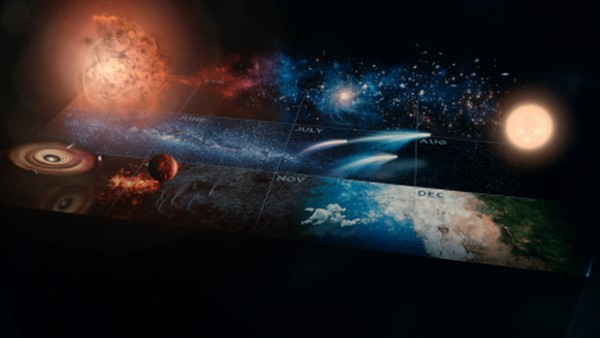

On Earth, all life needs water to some degree, but since there is no liquid water on Titan, scientists posit that life on the moon could exist in the methane lakes and seas that cover it. And if we compare the two, then the natural gas reserves on Earth are a mere sub-fraction of those that exist on Titan. Given the vast bodies of liquid methane on Titan, the moon is a gigantic storehouse of what on Earth we call natural gas. The lakes on the moon as we glimpse them here are made of methane, and the rains are composed of ethane. Titan’s atmosphere is so cold that water exists only as solid mountainous blocks of ice.

It has an atmosphere somewhat similar to ours, but it is also quite a hostile place for life as we know it. The CGI on the show is second to none and the visuals are always mesmerising and beautiful.įor example, in this episode, we take a trip to Titan, one of the largest moons of Saturn. That fishes today could have better eyesight than us, all because of how light interacts with different mediums like air and water, and how the bio-lenses in our eyes (or that of any other creature on Earth) process that light.īut then that is exactly why I love this show, because it exposes me to such amazing concepts and it brings them to cinematic life. The development of the eyes is perhaps one of the most truly amazing things I’ve seen or read about, partly because of what it implies, that our eyes are unchanged for thousands of years and that our distant ancestors when they were still water-bound had much better eyesight than us. This is a very long and extended subject in the episode, and I found it to be very fascinating indeed. We owe the biomechanics of our eyes to a process that began millions of years ago and then plateaued out once our most distant ancestors crawled out from the oceans and began to live on land.

Neil then dovetails into an explanation of how natural selection and the process of evolution led to the creation of eyes. Whether we talk about German Shepherds or Pomeranians, all these dogs species have a common ancestor, the wild wolves, thousands of years ago. From perhaps a very, very small handful of species of wild wolves, today we have hundreds of varieties of dogs. Measured in mere minutes on the last days of the cosmic calendar (see review for Ep 1), humans bred and trained wolves to become guardians and pets. To explain the concept of selective breeding and artificial selection, Neil uses one of the commonest examples available to us: the domestication of wild wolves, which eventually led to the evolution of dogs. We develop new technologies to answer these questions. We are an inquisitive species, and the search for the whys and whats and hows and whens etc drive us to better ourselves collectively. This is why we look for answers in all sorts of things around us. It is also a summation of human history, our penchant for exploration. Which, I have to say, is a great summation of what this show is about and the intended audience for this show. The only shame is in pretending you know all the answers”. The money quote in this episode is when Neil says “There’s no shame in admitting what you don’t know. And he talked about concepts like artificial selection and selective breeding, imparting once more to the viewer in a straightforward manner how evolution works, whether through nature, or through our own hands. This time, we got the Tree of Life, a representation of all the millions of lifeforms that have evolved on the Earth over the millions of years of its existence, and those that have died out. With the second episode, “Some of The Things That Molecules Do”, I was expecting something similar, and the show definitely did not disappoint me. I knew some of these things already, having read about the in school and college, but it was the visuals that really captured me, especially the cosmic calendar. The episode exposed me to some really amazing sights as the host explored the theory of the birth of the universe and the creation of the solar system and the wider universe and multiverse through the spaceship of imagination, a fantastical construct that becomes the vehicle of this exploration.
COSMOS A SPACETIME ODYSSEY SEASON 1 EPISODE 2 SERIES
Last week I watched the first episode of the Neil deGrasse Tyson-hosted documentary series Cosmos: A Spacetime Odyssey.


 0 kommentar(er)
0 kommentar(er)
